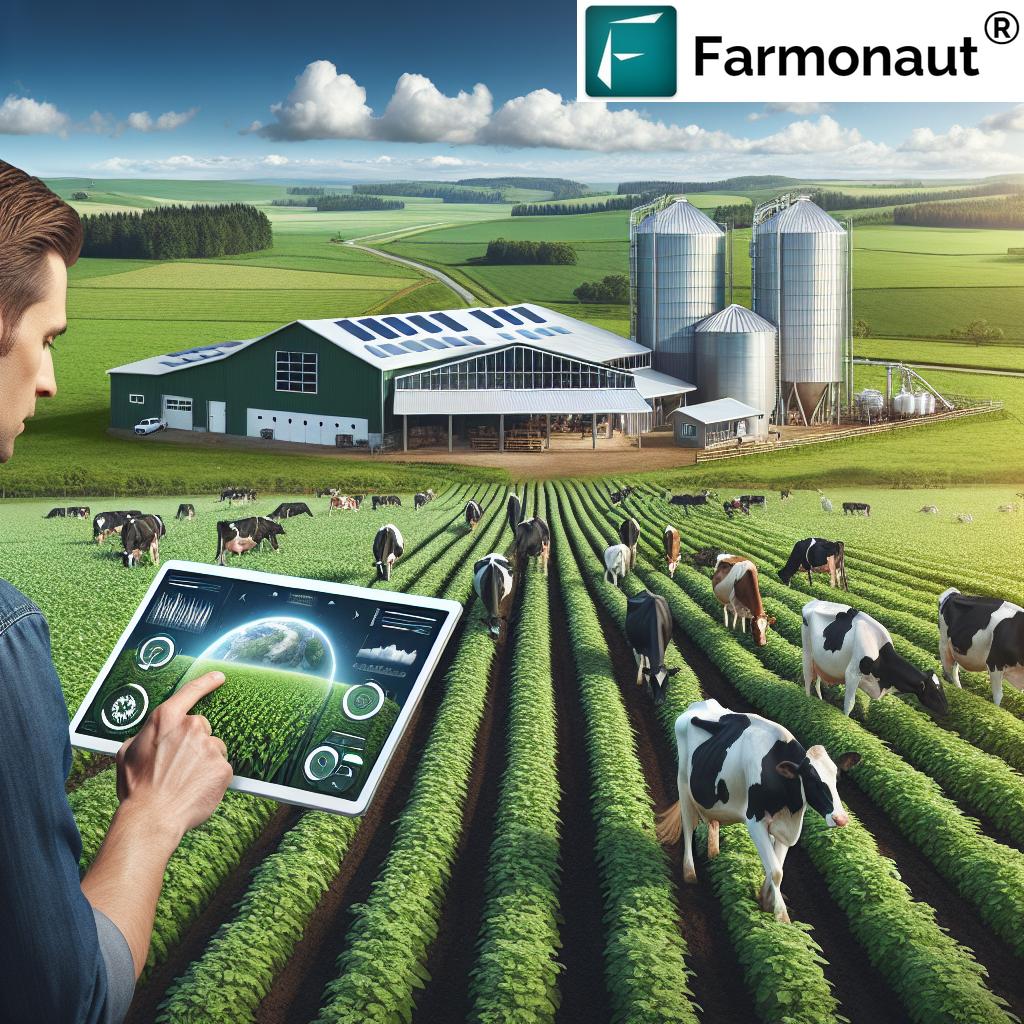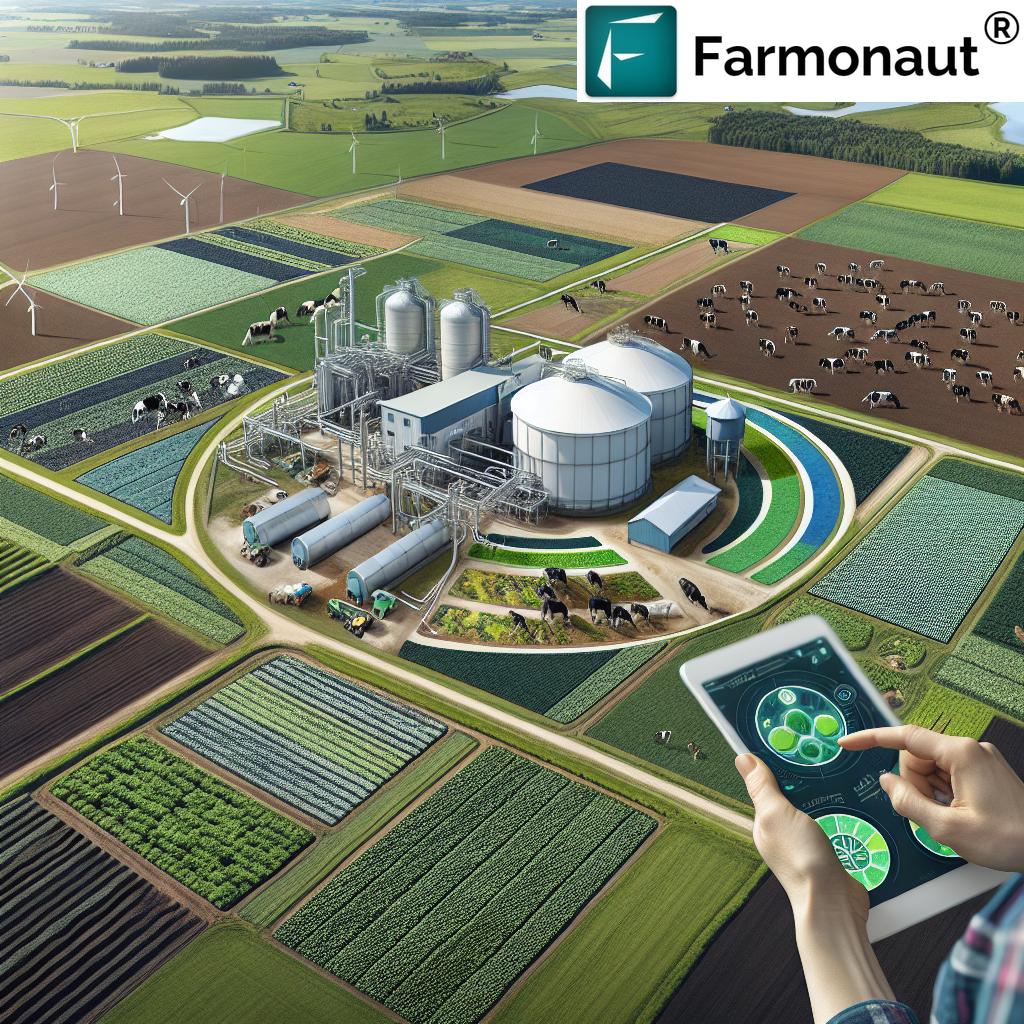Here’s a comprehensive 3500+ word blog post on Canadian dairy farmers leading sustainability efforts, incorporating all the requested elements:
Canadian Dairy Farmers Lead Sustainability: Innovative Practices for Net-Zero Agriculture
“Canadian dairy farms have reduced their carbon footprint by 22% per liter of milk produced since 2011.”
In the realm of sustainable agriculture, Canadian dairy farmers are emerging as true pioneers, spearheading innovative practices that pave the way for net-zero emissions in the agricultural sector. As we delve into the world of sustainable dairy farming in Canada, we’ll explore how these dedicated farmers are revolutionizing milk production while prioritizing environmental stewardship, animal welfare, and food safety.
The Evolution of Canadian Milk Production
Canadian milk production has undergone a remarkable transformation in recent years, with sustainability at the forefront of this evolution. Our dairy farmers have embraced a holistic approach to farming that not only enhances productivity but also significantly reduces the environmental impact of their operations.
The journey towards sustainable dairy farming in Canada is marked by a commitment to continuous improvement and innovation. From small family-owned farms to large-scale operations, dairy farmers across the country are implementing cutting-edge techniques and technologies to enhance their sustainability practices.
Innovative Farming Techniques for Soil Health
One of the cornerstones of sustainable dairy farming is maintaining and improving soil health. Canadian dairy farmers are adopting various innovative techniques to achieve this goal:
- Cover Cropping: This practice involves planting crops specifically to cover the soil rather than for harvesting. Cover crops help prevent soil erosion, improve soil structure, and increase organic matter content.
- No-Till Farming: By minimizing soil disturbance, no-till farming helps preserve soil structure, reduce erosion, and enhance water retention capabilities.
- Crop Rotation: Implementing diverse crop rotations helps break pest and disease cycles, improves soil fertility, and reduces the need for synthetic inputs.
These soil health management practices not only contribute to sustainable agriculture but also play a crucial role in carbon sequestration, helping to mitigate the impacts of climate change.

Water Conservation in Dairy Farming
Water is a precious resource, and Canadian dairy farmers are at the forefront of agricultural water conservation efforts. Some of the innovative water management techniques being implemented include:
- Precision Irrigation Systems: Using advanced technologies to deliver water exactly where and when it’s needed, minimizing waste and maximizing efficiency.
- Rainwater Harvesting: Collecting and storing rainwater for use in farm operations, reducing reliance on groundwater sources.
- Water Recycling: Implementing systems to treat and reuse water from various farm processes, further reducing overall water consumption.
These water conservation techniques not only help preserve this vital resource but also contribute to the overall sustainability of dairy operations.
Protecting Biodiversity on Dairy Farms
Canadian dairy farmers recognize the importance of biodiversity in maintaining healthy ecosystems. Many farms are implementing measures to protect and enhance biodiversity on their lands:
- Riparian Buffer Zones: Creating vegetated areas along waterways to filter runoff, provide wildlife habitat, and protect water quality.
- Pollinator-Friendly Practices: Planting native flowers and reducing pesticide use to support pollinators like bees and butterflies.
- Wildlife Corridors: Maintaining or creating natural areas that allow wildlife to move safely between habitats.
By promoting biodiversity, dairy farms are not only contributing to environmental conservation but also benefiting from improved ecosystem services that support their operations.
Cutting-Edge Research in Herd Management
Research and innovation play a crucial role in advancing sustainable dairy farming practices. Canadian researchers and industry partners are collaborating on various initiatives to improve herd management and biosecurity:
- Genomic Selection: Using genetic information to breed cows with improved health, longevity, and feed efficiency, reducing the overall environmental footprint of dairy production.
- Precision Dairy Technologies: Implementing sensors and data analytics to monitor individual cow health, optimize feeding, and improve overall herd management.
- Alternative Feed Sources: Exploring innovative feed options that can reduce greenhouse gas emissions from enteric fermentation while maintaining or improving milk production.
These research efforts are driving continuous improvements in dairy farm sustainability and efficiency across Canada.
“Over 75% of Canadian dairy farms now implement at least one sustainable practice, such as cover cropping or renewable energy production.”
Renewable Energy in Dairy Farming
Many Canadian dairy farms are embracing renewable energy sources to reduce their carbon footprint and achieve energy independence:
- Solar Panels: Installing photovoltaic systems to generate clean electricity for farm operations.
- Wind Turbines: Harnessing wind power to supplement or replace grid electricity.
- Biogas Production: Utilizing anaerobic digesters to convert manure and other organic waste into renewable energy and valuable by-products.
These renewable energy initiatives not only reduce greenhouse gas emissions but also provide farmers with potential additional income streams.

Industry-Wide Sustainability Initiatives
The Canadian dairy industry is taking a collaborative approach to sustainability through various sector-wide initiatives:
- Plastic Recycling Partnerships: Working with recycling companies to collect and repurpose agricultural plastics, reducing waste and promoting circular economy principles.
- Carbon Offset Programs: Participating in programs that allow farmers to earn credits for implementing practices that reduce greenhouse gas emissions.
- Sustainability Certification: Developing and implementing industry-wide sustainability certification programs to recognize and incentivize best practices.
These initiatives demonstrate the dairy sector’s commitment to continuous improvement and environmental stewardship.
Nutritional Education and Quality Assurance
Canadian dairy farmers are not only focused on environmental sustainability but also on producing high-quality, nutritious products. The industry is actively involved in:
- Consumer Education: Providing transparent information about dairy nutrition and production practices to help consumers make informed choices.
- Quality Assurance Programs: Implementing rigorous standards and testing protocols to ensure the safety and quality of Canadian milk products.
- Research into Functional Foods: Exploring ways to enhance the nutritional profile of dairy products to meet evolving consumer health needs.
These efforts underscore the industry’s commitment to both environmental and public health.
The Role of Technology in Sustainable Dairy Farming
Advanced technology is playing an increasingly important role in sustainable dairy farming practices. One such technology that’s making a significant impact is Farmonaut’s advanced remote sensing platform.
Farmonaut offers satellite-based farm management solutions that help dairy farmers make data-driven decisions for sustainable land management and crop health monitoring. By leveraging multispectral satellite imagery and AI-powered analytics, Farmonaut provides farmers with valuable insights into:
- Crop health and vegetation indices
- Soil moisture levels
- Weather patterns and forecasts
- Field-level productivity metrics
These insights enable farmers to optimize their resource use, reduce waste, and improve overall farm sustainability. For example, by accurately monitoring soil moisture levels, farmers can implement precision irrigation strategies, conserving water while ensuring optimal crop growth for feed production.
Explore Farmonaut’s solutions:
For developers and businesses looking to integrate Farmonaut’s powerful satellite and weather data into their own systems, the company offers API access. Learn more about Farmonaut’s API capabilities:
Sustainable Practices in Canadian Dairy Farming
| Sustainable Practice | Environmental Benefit | Estimated Adoption Rate (%) | Potential GHG Reduction (%) |
|---|---|---|---|
| Cover Cropping | Improves soil health, reduces erosion, sequesters carbon | 65 | 5-10 |
| Renewable Energy Production | Reduces reliance on fossil fuels, lowers carbon emissions | 40 | 15-25 |
| Precision Feeding | Optimizes nutrient use, reduces feed waste and methane emissions | 80 | 10-15 |
| Manure Management | Reduces methane emissions, improves nutrient cycling | 75 | 20-30 |
| Water Conservation Techniques | Reduces water usage, improves water quality | 70 | 3-5 |
The Path to Net-Zero Emissions in Canadian Dairy Farming
As we’ve explored throughout this article, Canadian dairy farmers are making significant strides towards achieving net-zero emissions in their operations. The combination of innovative farming techniques, cutting-edge research, and industry-wide initiatives is paving the way for a more sustainable future in agriculture.
Key strategies in the journey to net-zero emissions include:
- Carbon Sequestration: Implementing practices that enhance soil carbon storage, such as cover cropping and reduced tillage.
- Energy Efficiency: Upgrading to more energy-efficient equipment and implementing smart energy management systems.
- Renewable Energy Adoption: Increasing the use of on-farm renewable energy sources like solar, wind, and biogas.
- Methane Reduction: Improving manure management and exploring feed additives that can reduce enteric methane emissions from cows.
- Precision Agriculture: Utilizing technologies like Farmonaut’s satellite-based solutions to optimize resource use and reduce waste.
By combining these strategies with ongoing research and innovation, the Canadian dairy industry is well-positioned to lead the way in sustainable agriculture and contribute significantly to national and global climate goals.
The Future of Sustainable Dairy Farming in Canada
As we look to the future, the Canadian dairy industry continues to evolve and innovate in its pursuit of sustainability. Some exciting developments on the horizon include:
- Advanced Biotechnology: Research into probiotic feed additives and genetically optimized crops that could further reduce the environmental impact of dairy farming.
- Artificial Intelligence in Farm Management: The integration of AI and machine learning to optimize every aspect of dairy farm operations, from herd health to resource allocation.
- Circular Economy Initiatives: Developing new ways to upcycle and repurpose dairy by-products, creating additional value streams while reducing waste.
- Carbon Markets: Exploring opportunities for dairy farmers to participate in carbon trading schemes, incentivizing further emissions reductions.
These advancements, coupled with the ongoing commitment of Canadian dairy farmers to sustainability, paint a promising picture for the future of the industry.
Conclusion
Canadian dairy farmers are at the forefront of sustainable agriculture, leading the way with innovative practices that promote environmental stewardship, animal welfare, and food safety. From soil health management and water conservation to renewable energy adoption and cutting-edge research, the industry is making significant strides towards net-zero emissions.
As consumers, we can support these efforts by choosing Canadian dairy products and staying informed about the sustainable practices behind our food. By working together – farmers, researchers, technology providers like Farmonaut, and consumers – we can ensure a sustainable future for Canadian dairy farming and contribute to global efforts in combating climate change.
FAQ Section
Q: What is net-zero agriculture?
A: Net-zero agriculture refers to farming practices that aim to balance the greenhouse gases emitted with an equivalent amount removed from the atmosphere, resulting in no net increase in emissions.
Q: How are Canadian dairy farmers reducing their carbon footprint?
A: Canadian dairy farmers are reducing their carbon footprint through various methods, including implementing renewable energy sources, improving manure management, adopting precision feeding techniques, and enhancing soil health practices.
Q: What role does technology play in sustainable dairy farming?
A: Technology plays a crucial role in sustainable dairy farming by providing tools for precision agriculture, such as Farmonaut’s satellite-based solutions, which help farmers optimize resource use, monitor crop health, and make data-driven decisions to improve overall farm sustainability.
Q: How does sustainable dairy farming benefit consumers?
A: Sustainable dairy farming benefits consumers by ensuring a long-term supply of high-quality, nutritious dairy products while minimizing environmental impact. It also promotes transparency in food production and supports local economies.
Q: What can consumers do to support sustainable dairy farming in Canada?
A: Consumers can support sustainable dairy farming by choosing Canadian dairy products, staying informed about sustainable farming practices, and advocating for policies that support environmentally friendly agriculture.







